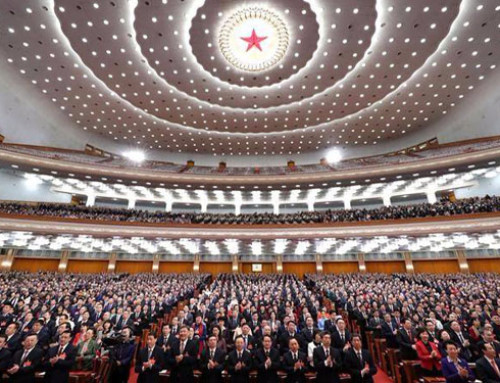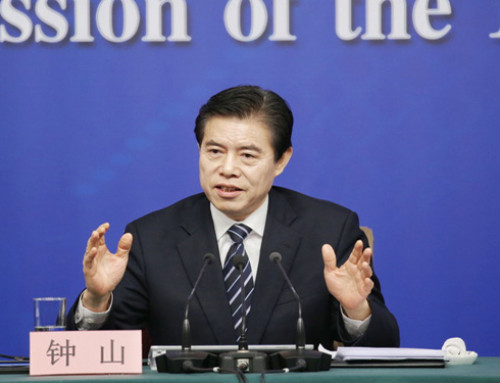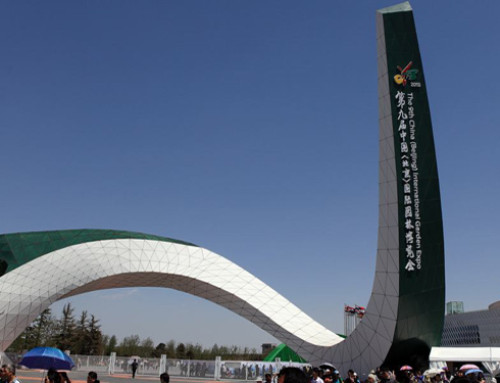Table of Contents
Chapter 1 General
Chapter II Investment Promotion
Chapter III Investment Protection
Chapter IV Investment Management
Chapter V Legal Liability
Chapter VI Supplementary Provisions
Chapter I General
Article 1 In order to further expand opening up, actively promote foreign investment, protect the legitimate rights and interests of foreign investment, regulate foreign investment management, promote the formation of a comprehensive new opening pattern, and promote the healthy development of the socialist market economy, this Law is enacted in accordance with the Constitution.
Article 2 This Law applies to foreign investment in the territory of the People’s Republic of China (hereinafter referred to as China).
Foreign investment referred to in this Law refers to the investment activities of foreign natural persons, enterprises or other organizations (hereinafter referred to as foreign investors) directly or indirectly in China, including the following situations:
(1) Foreign investors set up foreign-invested enterprises in China alone or jointly with other investors;
(2) Foreign investors obtain shares, shares, property shares or other similar rights and interests of enterprises within the territory of China;
(3) Foreign investors investing in new projects in China alone or jointly with other investors;
(4) Investment in laws, administrative regulations or other methods prescribed by the State Council.
Foreign-invested enterprises referred to in this Law refer to enterprises that are wholly or partly invested by foreign investors and registered in China within the Chinese laws.
Article 3 The State adheres to the basic national policy of opening to the outside world and encourages foreign investors to invest in China.
The state implements a high-level investment liberalization and facilitation policy, establishes and improves foreign investment promotion mechanisms, and creates a stable, transparent, predictable and fair market environment.
Article 4 The State implements a pre-entry national treatment plus a negative list management system for foreign investment.
The pre-entry national treatment referred to in the preceding paragraph refers to the treatment given to foreign investors at the stage of investment access and their investment is not lower than that of domestic investors and their investments; the so-called negative list refers to the state regulations for foreign investment in specific areas. Special management measures for access to investment implementation. The state gives national treatment to foreign investment outside the negative list.
The negative list is issued or approved by the State Council.
Where international treaties or agreements concluded or acceded to by the People’s Republic of China have more preferential provisions for the admission of foreign investors, they may be implemented in accordance with relevant regulations.
Article 5 The State protects the investment, income and other legitimate rights and interests of foreign investors in China in accordance with the law.
Article 6 Foreign investors and foreign-invested enterprises that conduct investment activities within China shall abide by Chinese laws and regulations and shall not endanger China’s national security or harm the public interest.
Article 7 The competent commerce department of the State Council and the competent department of investment shall, in accordance with the division of responsibilities, carry out the promotion, protection and management of foreign investment; other relevant departments of the State Council shall be responsible for the promotion, protection and management of foreign investment within their respective functions and responsibilities.
The relevant departments of the local people’s governments at or above the county level shall, in accordance with laws and regulations and the division of responsibilities determined by the people’s government at the same level, carry out the work of promoting, protecting and managing foreign investment.
Article 8 Workers of foreign-invested enterprises shall establish trade union organizations according to law, carry out trade union activities, and safeguard the legitimate rights and interests of employees. Foreign-invested enterprises shall provide necessary business conditions for the trade unions of the enterprise.
Chapter II Investment Promotion
Article 9 Foreign-funded enterprises shall equally apply the policies of the state to support the development of enterprises in accordance with the law.
Article 10 The formulation of laws, regulations and rules related to foreign investment shall take appropriate measures to solicit opinions and suggestions from foreign-invested enterprises.
Normative documents and referee documents related to foreign investment shall be announced in a timely manner according to law.
Article 11 The State establishes and improves a foreign-invested service system to provide advice and services to foreign investors and foreign-invested enterprises on laws and regulations, policy measures, and investment project information.
Article 12 The State establishes multilateral and bilateral investment promotion cooperation mechanisms with other countries and regions and international organizations, and strengthens international exchanges and cooperation in the field of investment.
Article 13 The State establishes special economic zones according to needs, or implements experimental policies and measures for foreign investment in some areas to promote foreign investment and expand opening up.
Article 14 The State encourages and guides foreign investors to invest in specific industries, fields and regions in accordance with the needs of national economic and social development. Foreign investors and foreign-invested enterprises may enjoy preferential treatment in accordance with laws, administrative regulations or the provisions of the State Council.
Article 15 The State guarantees that foreign-invested enterprises shall participate in the standard-setting work on an equal footing according to law, and strengthen the information disclosure and social supervision of standard-setting.
The mandatory standards set by the state are equally applicable to foreign-invested enterprises.
Article 16 The State guarantees that foreign-invested enterprises participate in government procurement activities through fair competition in accordance with the law. Government procurement treats products and services provided by foreign-invested enterprises in China in accordance with law.
Article 17 Foreign-invested enterprises may, in accordance with the law, finance through public offering of stocks, corporate bonds and other securities.
Article 18 Local people’s governments at or above the county level may, in accordance with the provisions of laws, administrative regulations and local regulations, formulate policies and measures for foreign investment promotion and facilitation within statutory jurisdiction.
Article 19 The people’s governments at all levels and their relevant departments shall, in accordance with the principles of convenience, efficiency and transparency, simplify procedures, improve efficiency, optimize government services, and further improve the level of foreign investment services.
The relevant competent authorities shall prepare and publish foreign investment guidelines to provide services and facilities for foreign investors and foreign-invested enterprises.
Chapter III Investment Protection
Article 20 The State does not impose an investment on foreign investors.
In special circumstances, the state may levy or expropriate the investment of foreign investors in accordance with the law for the needs of the public interest. The expropriation and requisition shall be conducted in accordance with legal procedures and timely and reasonable compensation shall be given.
Article 21 Foreign investors’ capital contribution, profits, capital gains, assets disposal income, intellectual property license fees, legally obtained compensation or compensation, liquidation income, etc., may be freely remitted in RMB or foreign exchange according to law. Export.
Article 22 The State protects the intellectual property rights of foreign investors and foreign-invested enterprises, protects the legitimate rights and interests of intellectual property rights holders and related rights holders, and pursues legal liability for intellectual property rights infringements in strict accordance with the law.
The State encourages technical cooperation based on voluntary principles and business rules in the process of foreign investment. The conditions for technical cooperation are determined by equal negotiation between the parties to the investment in accordance with the principle of fairness. Administrative agencies and their staff shall not use administrative means to force the transfer of technology.
Article 23 The administrative organs and their staff members shall keep confidential the business secrets of foreign investors and foreign-invested enterprises that are known during the performance of their duties, and shall not disclose or illegally provide them to others.
Article 24 The people’s governments at all levels and their relevant departments shall formulate normative documents concerning foreign investment, which shall comply with the provisions of laws and regulations; without the basis of laws and administrative regulations, they shall not derogate from the legitimate rights and interests of foreign-invested enterprises or increase their obligations. Market access and exit conditions shall not be set, and normal production and operation activities of foreign-invested enterprises shall not be interfered.
Article 25 Local people’s governments at various levels and their relevant departments shall perform the policy commitments made to foreign investors and foreign-invested enterprises in accordance with the law and various types of contracts concluded in accordance with the law.
If the state’s interests and social public interests need to change policy commitments or contractual agreements, they shall be conducted in accordance with the statutory authority and procedures, and compensate foreign investors and foreign-invested enterprises for losses suffered as a result.
Article 26 The State establishes a complaint mechanism for foreign-invested enterprises, promptly handles problems reflected by foreign-invested enterprises or their investors, and coordinates and improves relevant policies and measures.
If a foreign-invested enterprise or its investors believe that the administrative actions of the administrative organ and its staff members infringe upon their legitimate rights and interests, they may apply for a coordinated solution through the complaints working mechanism of the foreign-invested enterprise.
If a foreign-invested enterprise or its investors believe that the administrative actions of the administrative organ and its staff members infringe upon their legitimate rights and interests, in addition to applying for a coordinated solution through the complaints working mechanism of the foreign-invested enterprise in accordance with the provisions of the preceding paragraph, they may also apply for administrative reconsideration and file an administrative lawsuit according to law. .
Article 27 Foreign-invested enterprises may establish and voluntarily participate in chambers of commerce and associations according to law. The Chamber of Commerce and Association shall carry out relevant activities in accordance with the provisions of laws, regulations and articles of association to safeguard the legitimate rights and interests of members.
Chapter IV Investment Management
Article 28 The negative list of foreign investment approval stipulates the areas where investment is prohibited, and foreign investors may not invest.
The negative list of foreign investment approvals stipulates the areas of restricted investment, and foreign investors should meet the conditions stipulated in the negative list.
Foreign investment is restricted to areas other than the negative list, and management is implemented in accordance with the principle of consistent domestic and foreign investment.
Article 29 If foreign investment needs to go through the approval and filing of investment projects, it shall be implemented in accordance with relevant state regulations.
Article 30 If a foreign investor invests in an industry or field that requires legal permission, it shall go through relevant licensing procedures in accordance with the law.
The relevant competent department shall, in accordance with the conditions and procedures consistent with domestic investment, review the application for permission of foreign investors, except as otherwise provided by laws and administrative regulations.
Article 31 The rules for the organization, organization and activities of foreign-invested enterprises shall be governed by the laws of the Company Law of the People’s Republic of China and the Law of the Partnership Enterprise of the People’s Republic of China.
Article 32 Foreign-invested enterprises that engage in production and business activities shall abide by the provisions of laws and administrative regulations concerning labor protection and social insurance, and handle matters such as taxation, accounting, foreign exchange, etc. in accordance with laws, administrative regulations and relevant state regulations, and accept relevant supervisors. Supervision and inspection carried out by the department according to law.
Article 33 If a foreign investor acquires a Chinese domestic enterprise or participates in the concentration of other business operators in other ways, it shall accept the centralized examination of the business operator in accordance with the provisions of the Anti-Monopoly Law of the People’s Republic of China.
Article 34 The State establishes a reporting system for foreign investment information. Foreign investors or foreign-invested enterprises shall submit investment information to the competent commercial authorities through the enterprise registration system and the enterprise credit information publicity system.
The content and scope of the foreign investment information report shall be determined according to the principle that is necessary; the investment information that can be obtained through the department information sharing shall not be required to be submitted again.
Article 35 The State establishes a foreign investment security review system to conduct security review of foreign investment that affects or may affect national security.
The security review decision made in accordance with the law is the final decision.
Chapter V Legal Liability
Article 36 Where a foreign investor invests in a foreign-invested access negative list that prohibits investment, the relevant competent department shall order it to stop the investment activities, and dispose of the shares, assets or other necessary measures within a time limit, and return to the state before the investment is implemented; If there is illegal income, the illegal income will be confiscated.
Where the investment activities of a foreign investor violates the restrictive access special management measures stipulated in the negative list of foreign investment access, the relevant competent department shall order the correction within a time limit and take necessary measures to meet the requirements for access to special management measures; if it fails to make corrections within the time limit, The provisions of the preceding paragraph are handled.
If the investment activities of foreign investors violate the provisions of the negative list of foreign investment access, in addition to the provisions of the preceding two paragraphs, they shall also bear corresponding legal liabilities according to law.
Article 37 If a foreign investor or a foreign-invested enterprise violates the provisions of this Law and fails to submit investment information in accordance with the requirements of the foreign investment information reporting system, the competent commercial authority shall order it to make corrections within a time limit; if it fails to make corrections within the time limit, it shall be more than 100,000 yuan. A fine of less than 500,000 yuan.
Article 38 Any violation of laws or regulations by foreign investors or foreign-invested enterprises shall be investigated and dealt with by relevant departments in accordance with the law and incorporated into the credit information system in accordance with relevant state regulations.
Article 39: If a staff member of an administrative organ abuses his power, neglects his duties or engages in malpractices in the promotion, protection and management of foreign investment, or leaks or illegally provides others with trade secrets that he or she knows in the course of performing his duties, he shall be punished according to law; Constitute a crime, be held criminally responsible.
Chapter VI Supplementary Provisions
Article 40 If any country or region adopts discriminatory prohibitions, restrictions or other similar measures on investment in the People’s Republic of China, the People’s Republic of China may take corresponding measures against the country or the region according to actual conditions.
Article 41 For foreign investors investing in the banking industry, securities industry, insurance industry and other financial industries in China, or in the securities market, foreign exchange market and other financial markets, if the state has other provisions, it shall be in accordance with its provisions.
Article 42 This Law shall come into force on January 1, 2020. The Law of the People’s Republic of China on Sino-Foreign Equity Joint Ventures, the Law of the People’s Republic of China on Foreign-Invested Enterprises, and the Law of the People’s Republic
Before the implementation of this Law, foreign-invested enterprises established in accordance with the Law of the People’s Republic of China on Sino-Foreign Equity Joint Ventures, the Law of the People’s Republic of China on Foreign-funded Enterprises, and the Law of the People’s Republic of China on Chinese-Foreign Contractual Joint Ventures may continue within five years after the implementation of this Law. Retain the original business organization and so on. The specific implementation measures shall be prescribed by the State Council.
Regulation Source: The National People’s Congress of the People’s Republic of China













